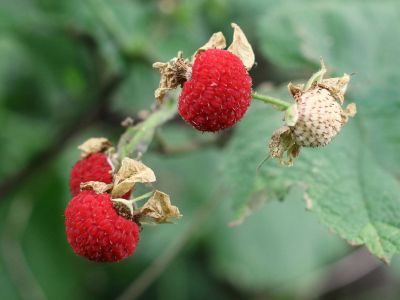Are Thimbleberries Edible?
Thimbleberries are great for wildlife but are thimbleberries edible to humans too? Yes. In fact, they were once an important food of the native tribes of the region. So, if you have berries on the brain, try growing thimbleberry. This native plant is a deciduous shrub and a thornless wild species. It is found wild in disturbed sites, along wooded hills, and near streams. It is one of the first plants to reestablish after fires. As a native plant it is quite adaptable in its range and easy to grow. The humble thimbleberry produces bright red, juicy fruits that pull from the plant, leaving behind the torus, or core. This lends them the appearance of a thimble, hence the name. The fruits are not really a berry but a drupe, a group of druplets. The fruit tends to fall apart which means it does not pack well and is not in cultivation. However, it is edible, although slightly tart and seedy. It is excellent in jam. Many animals also enjoy browsing on the bushes. Indigenous people ate the fruit fresh during the season and dried it for winter consumption. The bark was also made into an herbal tea and the leaves used fresh as a poultice.
Thimbleberry Facts
The thimbleberry plant can grow up to 8 feet (2 m.) tall. The new shoots bear after two to three years. The green leaves are large, up to 10 inches (25 cm.) across. They are palmate and finely hairy. The stems are also hairy but lack prickles. Spring flowers are white and form in clusters of four to eight. The highest fruit production is achieved by plants with cool summers because hot temperatures will stunt growth. The fruits become ripe in late summer to early fall. Thimbleberry plants are rangy but can make an informal hedge. They are excellent when used in the native or bird garden.
Thimbleberry Care
Thimbleberry is hardy to USDA zone 3. Once established, there is little maintenance with the plants. It is important to plant them in full to partial sun and keep the canes regularly moist. Remove canes that have fruited after berry harvest to allow the new canes sunlight and air. Thimbleberries grow in almost any soil, provided it is well draining. The plant is a host for the yellow banded sphinx moth. Insects that can cause problems are aphids and crown borers. Fertilizing annually should be part of good thimbleberry care. Watch for fungal diseases like leaf spot, anthracnose, powdery mildew, and Botrytis.
